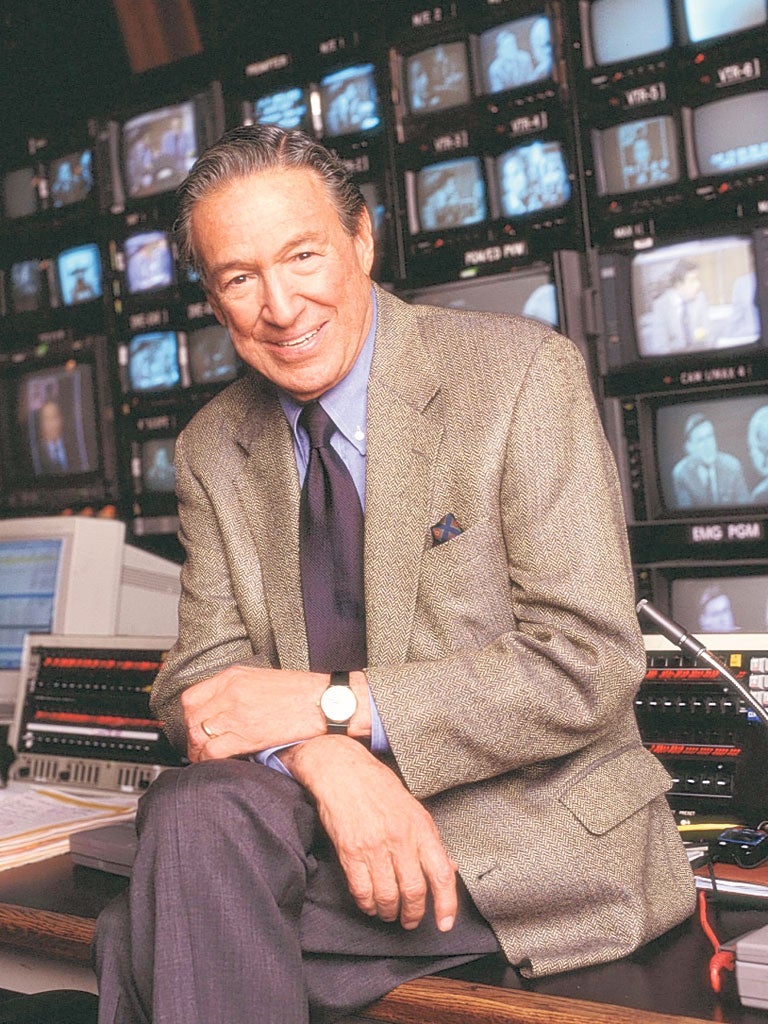Mike Wallace: Host of '60 Minutes' famed for his tough interviews
A cruel interview with the ‘totally self-absorbed’ Barbra Streisand led to the ‘Mike Malice’ nickname

Your support helps us to tell the story
From reproductive rights to climate change to Big Tech, The Independent is on the ground when the story is developing. Whether it's investigating the financials of Elon Musk's pro-Trump PAC or producing our latest documentary, 'The A Word', which shines a light on the American women fighting for reproductive rights, we know how important it is to parse out the facts from the messaging.
At such a critical moment in US history, we need reporters on the ground. Your donation allows us to keep sending journalists to speak to both sides of the story.
The Independent is trusted by Americans across the entire political spectrum. And unlike many other quality news outlets, we choose not to lock Americans out of our reporting and analysis with paywalls. We believe quality journalism should be available to everyone, paid for by those who can afford it.
Your support makes all the difference.The golden age of network news, running roughly from 1960 until the early 1990s, turned many American television journalists into stars. Few of them, though, came much bigger than Mike Wallace, master of the inquisitorial interview on 60 Minutes, the hugely successful CBS show that dominated TV news for much of that period. "There's no such thing as an indiscreet question," Wallace liked to say, before firing them off in all directions, to presidents and corporate tycoons, film stars, criminals and disgraced public and private figures of every ilk. With 60 Minutes he helped prove that television news could be serious and entertaining (and hugely profitable as well).
Wallace was inquisitorial and relentless. With his mellow baritone voice, he could come across as suave and worldly, one of the boys. But he did his homework. His speciality was the seeming softball question that paved the way for a carefully researched and barbed follow-up. If he didn't believe an answer, he would often repeat what he had just been told, with an inflection that was a dagger to the heart.
He was also a pioneer of the ambush interview. "You can't subpoena people to talk to you," Wallace once explained. "If you write to them and try to call them on the phone and they don't answer and so forth, then take them unawares." In later years, however, 60 Minutes' relied less on the technique: "it began to look as if we were actors, a caricature of ourselves." Indeed, some accused Wallace of practicing a celebrity journalism where the question was more important than the answer.
The son of Russian Jewish immigrants, he took his first job in radio after graduating from the University of Michigan in 1939, replacing his original name Myron with the on-air "Mike". During the Second World War he served with the US Navy in the Pacific, before returning to broadcasting, first radio and then with television.
The first signs of the relentless interviewer of the future came on a late night talk programme, Night Beat, which debuted in New York in 1956 before metamorphosing into a national show, The Mike Wallace Interview. But in 1958 it was cancelled, and five years later he joined CBS as an anchor and reporter, gaining the distinction of being ejected from the stormy Democratic convention in Chicago in 1968.
Then came 60 Minutes. Wallace was the first person hired by the original producer, Don Hewitt, for the hour-long news magazine, with its trademark ticking stopwatch introducing each segment. The show started slowly in the ratings, but by the late 1970s had made the Top 10, and stayed there until 2001, a feat unmatched by any other programme in history, let alone one mostly devoted to serious news.
Over the years Wallace registered many triumphs, as well as the odd disaster. The former included famous interviews with Nixon's Watergate henchman John Erlichman, and with Ayatollah Khomeini, early in the 1979 hostage crisis, in which he asked the Iranian leader what he thought of being called "a lunatic" by Egypt's president Anwar Sadat. A more cruel side (the one that earned him the nickname "Mike Malice'") was visible in an interview with Barbra Streisand, when he made fun of her decades of psychotherapy. "What is she trying to find out that takes 20 years?" he asked, calling Streisand "totally self-absorbed".
But Wallace's most stressful moment came in 1982, over a documentary in which he accused General William Westmoreland, the US commander in Vietnam between 1964 and 1968, of deliberately underestimating enemy troop strength for political purposes. Westmoreland sued, and the libel case dragged on for two years. Ultimately it was dropped, but CBS's name was tarnished. Wallace himself had a nervous breakdown; he was diagnosed with clinical depression and at one point attempted to kill himself. For years afterwards he was haunted by the affair.
But he carried on, officially retiring from 60 Minutes only in 2006, and making his last appearance in 2008 at the age of 89, when he interviewed Roger Clemens, a star implicated in baseball's steroids scandal. Why, people inevitably asked, did he keep going? "Because I wouldn't know what else to do," he replied, "it's as simple as that."
And to the end he revelled in his on-screen persona. "He loved being Mike Wallace," said Jeff Fager, executive producer of 60 Minutes and chairman of CBS News. "He loved the fact that if he showed up for an interview, it made people nervous. He knew – and he knew that everybody else knew – that he was going to get to the truth."
Myron Leon "Mike" Wallace, television journalist: born Brookline, Massachusetts 9 May 1918; married four times (one son, and one son deceased); died New Canaan, Connecticut 7 April 2012.
Join our commenting forum
Join thought-provoking conversations, follow other Independent readers and see their replies
Comments